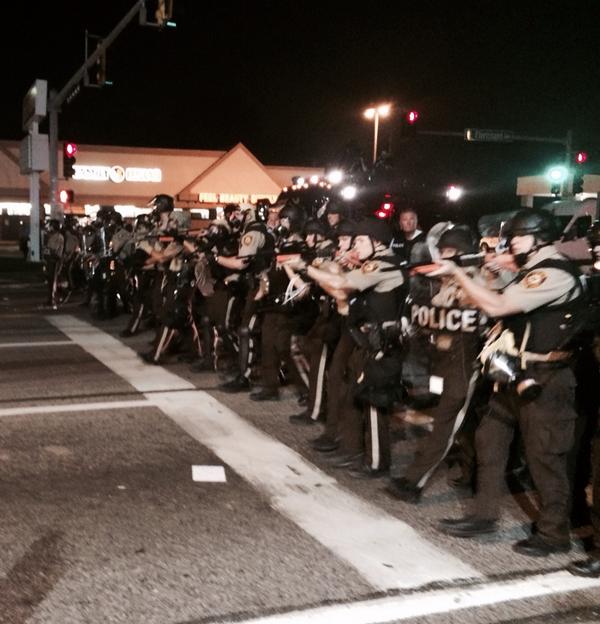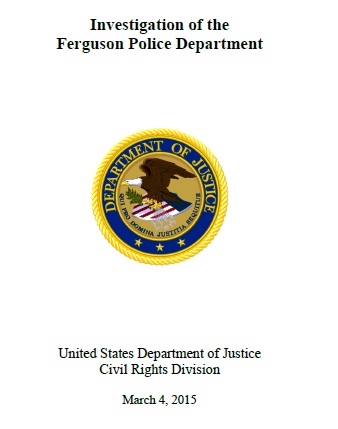The U.S. Department of Justice released a report today, March 4, 2015, on its investigation into the criminal investigation into the shooting death of Michael Brown by the Ferguson, Missouri police officer Darren Wilson. It concludes that “the evidence does not establish that the shots fired by Wilson were objectively unreasonable under federal law.”
However, the same day, the DOJ released a separate report on the “investigation of by the Ferguson police,” which showed a pattern of oppressive behavior and activity.
Quoting for the Department of Justice report:
“This culture within FPD influences officer activities in all areas of policing, beyond just ticketing. Officers expect and demand compliance even when they lack legal authority. They are inclined to interpret the exercise of free-speech rights as unlawful disobedience, innocent movements as physical threats, indications of mental or physical illness as belligerence. Police supervisors and leadership do too little to ensure that officers act in accordance with law and policy, and rarely respond meaningfully to civilian complaints of officer misconduct. The result is a pattern of stops without reasonable suspicion and arrests without probable cause in violation of the Fourth Amendment; infringement on free expression, as well as retaliation for protected expression, in violation of the First Amendment; and excessive force in violation of the Fourth Amendment.”
“Even relatively routine misconduct by Ferguson police officers can have significant consequences for the people whose rights are violated. For example, in the summer of 2012, a 32-year-old African-American man sat in his car cooling off after playing basketball in a Ferguson public park. An officer pulled up behind the man’s car, blocking him in, and demanded the man’s Social Security number and identification. Without any cause, the officer accused the man of being a pedophile, referring to the presence of children in the park, and ordered the man out of his car for a pat-down, although the officer had no reason to believe the man was armed. The officer also asked to search the man’s car. The man objected, citing his constitutional rights. In response, the officer arrested the man, reportedly at gunpoint, charging him with eight violations of Ferguson’s municipal code. One charge, Making a False Declaration, was for initially providing the short form of his first name (e.g., “Mike” instead of “Michael”), and an address which, although legitimate, was different from the one on his driver’s license. Another charge was for not wearing a seat belt, even though he was seated in a parked car. The officer also charged the man both with having an expired operator’s license, and with having no operator’s license in his possession. The man told us that, because of these charges, he lost his job as a contractor with the federal government that he had held for years.”
“Municipal court practices likewise cause disproportionate harm to African Americans. African Americans are 68% less likely than others to have their cases dismissed by the court, and are more likely to have their cases last longer and result in more required court encounters. African Americans are at least 50% more likely to have their cases lead to an arrest warrant, and accounted for 92% of cases in which an arrest warrant was issued by the Ferguson Municipal Court in 2013. Available data show that, of those actually arrested by FPD only because of an outstanding municipal warrant, 96% are African American. Our investigation indicates that this disproportionate burden on African Americans cannot be explained by any difference in the rate at which people of different races violate the law. Rather, our investigation has revealed that these disparities occur, at least in part, because of unlawful bias against and stereotypes about African Americans. We have found substantial evidence of racial bias among police and court staff in Ferguson. For example, we discovered emails circulated by police supervisors and court staff that stereotype racial minorities as criminals, including one email that joked about an abortion by an African-American woman being a means of crime control.”
“City officials have frequently asserted that the harsh and disparate results of Ferguson’s law enforcement system do not indicate problems with police or court practices, but instead reflect a pervasive lack of “personal responsibility” among “certain segments” of the community. Our investigation has found that the practices about which area residents have complained are in fact unconstitutional and unduly harsh. But the City’s personal-responsibility refrain is telling: it reflects many of the same racial stereotypes found in the emails between police and court supervisors. This evidence of bias and stereotyping, together with evidence that Ferguson has long recognized but failed to correct the consistent racial disparities caused by its police and court practices, demonstrates that the discriminatory effects of Ferguson’s conduct are driven at least in part by discriminatory intent in violation of the Fourteenth Amendment.”
Responsible for Equality And Liberty supports the universal human rights and dignity of all of our fellow human beings, including all Americans, under our Universal Declaration of Human Rights and in the USA, the American Constitution. Oppressive behavior that seeks to deny these rights and defy Constitution law must be rejected by all human rights activists and all patriotic Americans.

